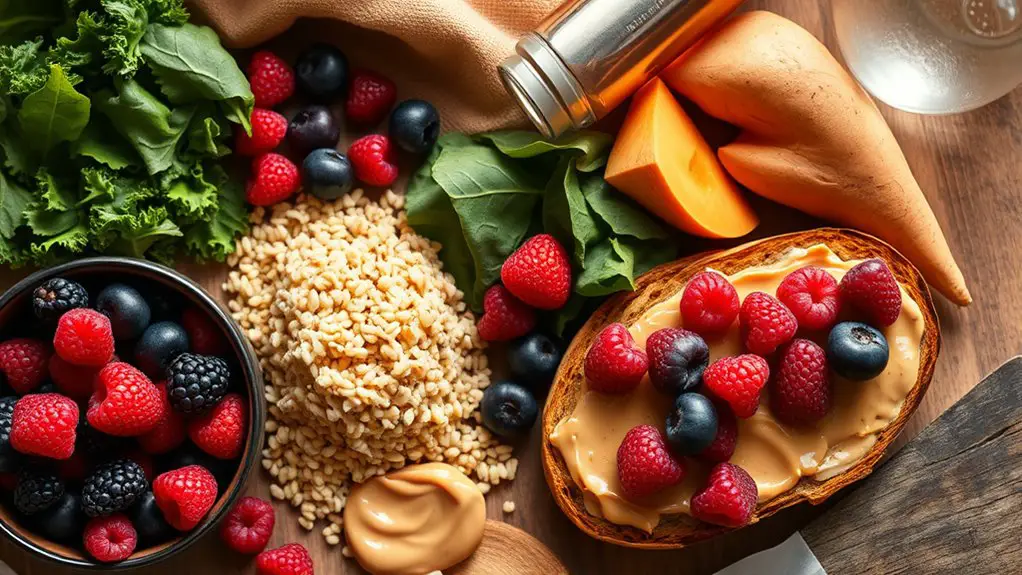Pre-workout timing is essential because it directly impacts your performance and recovery. When you fuel your body at the right time, you maximize energy levels and glycogen storage. For strength training, a longer fueling window is ideal, while endurance workouts benefit from immediate intake. Skipping or overeating can hinder performance, and hydration plays a key role too. Understanding your unique needs can enhance your effectiveness, and there's more to explore on how to optimize your pre-workout strategy.
The Science Behind Pre-Workout Nutrition
When you understand the science behind pre-workout nutrition, you can optimize your performance and recovery. Fueling your body with the right nutrients before a workout isn't just a trend; it's a strategy for freedom in your fitness journey. Carbohydrates provide the energy needed to power through intense sessions, while protein helps with muscle repair and growth. It's all about striking a balance that suits your unique needs.
Hydration plays an essential role too, as even mild dehydration can hinder your performance. Consider incorporating healthy fats, which can provide sustained energy without weighing you down. By timing your nutrition effectively, you'll elevate your workouts and feel more empowered in your physical pursuits. Additionally, maintaining an ideal macronutrient ratio before exercising can enhance your energy levels and performance.
Ultimately, understanding how these elements work together lets you take control of your body's potential, paving the way for greater achievements and a deeper sense of freedom in your fitness lifestyle.
Optimal Timing for Different Types of Workouts
When it comes to workout timing, different types of training require different approaches. For strength training, you might need a longer fueling window, while endurance workouts often benefit from a more immediate intake. Understanding these nuances can help you maximize your performance and recovery. Additionally, being aware of post-workout nutrition is crucial for effective recovery and performance enhancement.
Strength Training Timing
Understanding the ideal timing for strength training can greatly impact your performance and results. When you train at the right time, you harness your body's natural energy peaks. Generally, late afternoon or early evening proves best for many, as your body temperature and hormone levels are elevated. This can lead to increased strength and power during your workouts. If mornings work better for you, consider a light snack beforehand to fuel your session. Experimenting with different times can help you find what feels best. Remember, it's all about listening to your body and adapting your schedule. By aligning your strength training with your energy levels, you'll reveal your true potential and enjoy the freedom to push your limits further.
Endurance Workout Timing
Finding the right timing for endurance workouts can greatly enhance your performance, just as it does for strength training. Ideally, you'll want to fuel up about 30 to 60 minutes before hitting the road or trails. This window allows your body to digest and convert that fuel into energy you can tap into during your run or ride. Opt for easily digestible carbs, like a banana or an energy gel, to keep your stomach happy and your energy steady. If you prefer longer sessions, consider having a small snack an hour before you start. Remember, the goal is to feel light and energized, so listen to your body and adjust as needed. Timing can be your secret weapon for endurance success!
The Role of Macronutrients in Pre-Workout Meals
When planning your pre-workout meal, it's key to contemplate the role of macronutrients. Carbohydrates provide the energy you need to power through your session, while protein supports muscle repair and growth. Don't forget about fats, as they can enhance endurance during longer workouts. Additionally, proper timing of meals is critical for endurance performance, ensuring your body is adequately fueled when it needs it most.
Carbohydrates for Energy
While many factors contribute to workout performance, the role of carbohydrates as a primary energy source can't be overlooked. When you're gearing up for a session, loading up on carbs can give you that necessary boost. They break down quickly into glucose, fueling your muscles and keeping your energy levels high. Think of carbs as the fuel that keeps your fire burning bright. Whether it's whole grains, fruits, or starchy veggies, choosing the right carbs can enhance your endurance and power. You want to time your intake well, ideally consuming them about 30 to 60 minutes before you hit the gym. This way, you can release your full potential and enjoy the freedom that comes with peak performance.
Protein for Muscle Support
After fueling up with carbohydrates, it's time to contemplate protein for muscle support. Protein's essential for repairing and building muscle tissue, and getting the right amount before a workout can enhance your performance. Here's what to keep in mind:
- Type of Protein: Opt for lean sources like chicken, fish, or plant-based options. They're easier to digest and won't weigh you down.
- Timing: Aim to consume protein about 30 minutes to an hour before your workout. This way, your body has time to absorb it.
- Amount: Aiming for about 20-30 grams of protein can help you maximize muscle support without feeling sluggish.
Incorporating protein into your pre-workout meal can set you up for success and freedom in your fitness journey!
Fats for Endurance
Fats often get a bad rap in the world of fitness, but they're essential for endurance, especially for longer workouts. When you're out there pushing your limits, fats serve as a significant energy source. They provide sustained fuel, helping you maintain performance over time without the quick crashes that can come from relying solely on carbs. Including healthy fats like avocados, nuts, and olive oil in your pre-workout meal can keep your energy levels steady, allowing for that freedom to push harder and longer. Remember, it's all about balance. While carbs give you a quick boost, fats will power your endurance, making them a critical part of your pre-workout nutrition strategy. Embrace fats, and feel the difference in your performance!
Hydration: Timing Your Fluid Intake
To maximize your performance during workouts, it's crucial to pay attention to your hydration timing. Staying adequately hydrated can make a huge difference, so consider these tips to optimize your fluid intake:
- Pre-Workout: Aim to drink about 16-20 ounces of water 2-3 hours before your workout. This gives your body time to absorb the fluids and helps maintain your energy levels.
- During Workout: Sip on 7-10 ounces of water every 10-20 minutes while exercising. This keeps your hydration levels stable and prevents fatigue.
- Post-Workout: Replenish lost fluids by consuming 16-24 ounces of water for every pound lost during your session. This aids recovery and prepares you for your next workout. Additionally, monitoring urine color can help assess your hydration status and ensure you're properly replenished.
Supplements and Their Impact on Performance
While you might focus on your workout routine and hydration, supplements can also play a significant role in enhancing your performance. They offer a way to boost energy, endurance, and recovery, giving you that extra edge you crave. For instance, pre-workout formulas often contain ingredients like caffeine, which can increase your focus and intensity, helping you push through tough sessions. Creatine can enhance your strength and explosive power, making those heavy lifts feel more manageable. Additionally, using creatine supplements effectively can lead to improved recovery time between workouts, allowing you to train more frequently and intensely.
However, it's essential to choose the right supplements for your goals. You don't want to rely on them solely; they should complement your training and nutrition. Timing also matters—taking certain supplements before or after your workout can maximize their benefits. Remember, the right approach to supplementation can liberate your performance, allowing you to crush your fitness goals and feel empowered in your journey. Embrace the freedom to explore what works best for you!
Common Mistakes in Pre-Workout Nutrition
Even if you've got your workout plan down, overlooking proper pre-workout nutrition can hinder your performance. It's easy to make some common mistakes that can derail your efforts. Here are three pitfalls to avoid:
Neglecting pre-workout nutrition can sabotage your fitness goals; avoid these common mistakes for optimal performance.
- Skipping Carbs: Carbohydrates are your body's main fuel source. Skipping them can leave you feeling drained and unable to push yourself. Consuming the right amount of glycogen storage can help maintain your energy levels throughout your workout.
- Overeating: While fueling up is important, consuming too much can lead to discomfort during your workout. Aim for a balanced meal or snack that's just enough to energize you.
- Ignoring Hydration: Dehydration can greatly impact your performance. Don't forget to drink enough water before you hit the gym; it's a game-changer.
Personalizing Your Pre-Workout Strategy
Finding the right pre-workout strategy can make all the difference in your performance, as individual needs vary based on factors like workout intensity, duration, and personal preferences. It is crucial to tailor your approach for maximum effectiveness. Additionally, understanding pre-workout nutrition can significantly enhance your endurance and strength.
Here's a quick reference table to help you customize your pre-workout plan:
| Factor | Recommendation |
|---|---|
| Workout Intensity | High-carb snack 30 min prior |
| Duration | Hydrate well 1 hour before |
| Personal Preference | Listen to your body; adjust caffeine levels |
| Timing | Experiment with 30-60 min before |
Frequently Asked Questions
Can I Eat My Pre-Workout Meal the Night Before?
Eating your pre-workout meal the night before can be effective; studies show 70% of athletes benefit from nutrient timing. Just guarantee it's balanced, so you've got the energy you need when it's time to crush your workout!
How Does Caffeine Timing Affect Workout Performance?
Caffeine timing can boost your workout performance considerably. If you take it 30-60 minutes before exercising, you'll likely feel more energized and focused, helping you push through those tough sets with greater intensity and endurance.
Is It Okay to Skip Pre-Workout Nutrition?
Skipping pre-workout nutrition's okay if you feel fine, but it might impact your energy levels and performance. If you want to maximize your workout, consider fueling up beforehand for better results and endurance.
What Snacks Are Best for Quick Pre-Workout Energy?
For quick pre-workout energy, grab bananas, Greek yogurt, or energy bars. They're easy to digest and packed with carbs and protein. Just be sure to eat them about 30 minutes before your workout for best results.
How Does Stress Impact Pre-Workout Nutrition Effectiveness?
Stress can hinder your body's ability to absorb nutrients, making pre-workout nutrition less effective. When you're stressed, your focus shifts, impacting energy levels and potentially diminishing the benefits of your carefully chosen pre-workout snacks.




